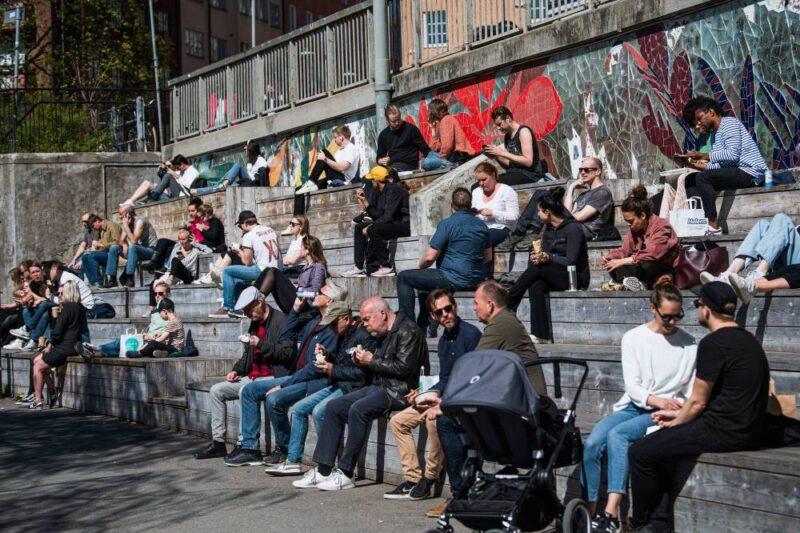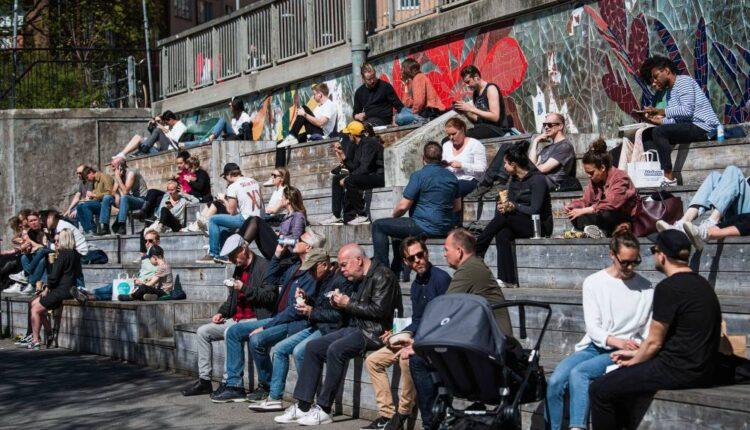
- Unlike its neighbors, Sweden did not impose a lockdown amid the coronavirus outbreak.
- The strategy — basically, one that aimed at building a broad-base of immunity while protecting at-risk groups like the elderly — has proved controversial.
- But Sweden's chief epidemiologist has said "herd immunity" could be reached in Stockholm within weeks.
Remember what this felt like? People enjoy the warm spring weather at Hornstull in Stockholm on April 21, 2020, during the new coronavirus COVID-19 pandemic.JONATHAN NACKSTRAND
Its neighbors closed borders, schools, bars and businesses as the coronavirus pandemic swept through Europe, but Sweden went against the grain by keeping public life as unrestricted as possible.
The strategy — basically, one that aimed to slow the spread of the virus while allowing some exposure to it, aiming to build immunity among the general population while protecting high-risk groups like the elderly — has been controversial, with some health experts likening it to playing "Russian roulette" with public health.
But now, the country's chief epidemiologist has said that the strategy appears to be working and that "herd immunity" could be reached in the capital Stockholm in a matter of weeks.
"In major parts of Sweden, around Stockholm, we have reached a plateau (in new cases) and we're already seeing the effect of herd immunity and in a few weeks' time we'll see even more of the effects of that. And in the rest of the country, the situation is stable," Anders Tegnell, the chief epidemiologist at Sweden's Public Health Agency, told CNBC Tuesday.
Herd immunity among a population is usually achieved through vaccination, it is seen to be reached when around 60% of citizens are deemed immune. Without a vaccine for the coronavirus available, however, scientists are looking at whether exposure to (and recovery from) the coronavirus leads to longterm immunity; there have been cases of coronavirus reinfection, for example.
Tegnell said sampling and modeling data indicated that 20% of Stockholm's population is already immune to the virus, and that "in a few weeks' time we might reach herd immunity and we believe that is why we're seeing a slow decline in cases, in spite of sampling (testing for the coronavirus) more and more."
"Unfortunately the mortality rate is high due to the introduction (of the virus) in elderly care homes and we are investigating the cause of that," he said.
The major part of Sweden's 15,322 confirmed cases are in Stockholm and its surrounding areas, with very small incidences of the virus in the rest of Sweden — a country of around 10 million that has a low population density outside its urban hubs.
The country has recorded 1,765 deaths, however, and that number is far higher than its neighbors that imposed far stricter lockdowns.
The number of cases in Sweden is almost double that seen in neighboring Denmark (it has 8,108 cases and has reported 370 deaths) and Finland (with just over 4,000 cases and 141 deaths) that imposed strict lockdown measures.
Tegnell said that Sweden's decision to test more groups of people (it had originally only tested those who came into hospital but is now testing more key workers and those in care homes) was a reason for the number of confirmed cases not declining as quickly as they could have done.
Sweden is currently testing around 20,000 people a week and hopes to increase that to 100,000 a week in a few weeks' time, Tegnell said.
VIDEO5:5005:50What is a pandemic?Coronavirus
Elderly paying the price?
While the number of new cases appears to be declining, achieving herd immunity has proved controversial. Tacitly allowing the virus to spread (albeit having put measures in place to slow its spread) puts the elderly and people with existing health conditions at a greater risk of becoming seriously ill and, potentially, dying.
Tegnell conceded that the situation in Sweden's care homes, which have seen the majority of deaths from the coronavirus, is worrying.
"The death toll is very closely related to elderly care homes. More than half of the people that have died have lived in elderly care homes." Tegnell said, adding that he and the Public Health Agency are "still very concerned about the elderly."
"It's the group we said we needed to protect," he said, stating the agency was working with homes to see what improvements could be made to lower risk factors.
Nonetheless, Tegnell said he was "fairly confident" in the strategy his agency had pursued but said it would be too early for the Swedish government to lift restrictions imposed to delay the spread of the virus. "A big part of the country has not been affected at all yet."
"(But) if you look at the exit strategies that now many countries have opted for, they look very much like Sweden's (strategy and restrictions)," he said.
People enjoy themselves at an outdoor restaruant, amid the coronavirus disease (COVID-19) outbreak, in central Stockholm, Sweden, on April 20, 2020.ANDERS WIKLUND
Tegnell said that soon, several studies will be published to show the extent of infection and recovery (and hopefully) immunity to the virus. Data showed the peak of infections had already been reached in Stockholm.
Sweden's response to the pandemic has been guided by Tegnell and the Public Health Agency. While other countries have gone into lockdown at the advice of their scientific advisors, Sweden was conspicuous in its different approach, largely trusting the public to adopt voluntary measures to delay the spread of the virus.
Sweden's government has advocated working from home if at all possible and to avoid non-essential travel and social contact with the elderly. Meanwhile, restaurants, bars, cafés and nightclubs have been offering seated table service only and gatherings of more than 50 people have been banned. Yet schools for under 16-year-olds have remained open and life has generally carried on as before just at a quieter pace.
Tegnell said the country was conducting more widespread testing and sampling to gauge the extent of the outbreak.
"We are right now going out and doing countrywide tests on immunity to see what big differences we have in different parts of Sweden," Tegnell said. "It's a little bit of a mystery why nothing has really happened in other parts of Sweden."
"The virus keeps on surprising us when it comes to this," he said, noting that the most southern region of the country, which borders Denmark, had seen relatively few cases given its border location and the constant movement of people between the countries, which was allowed to continue in the most part, despite the virus.
Source: cnbc.com

